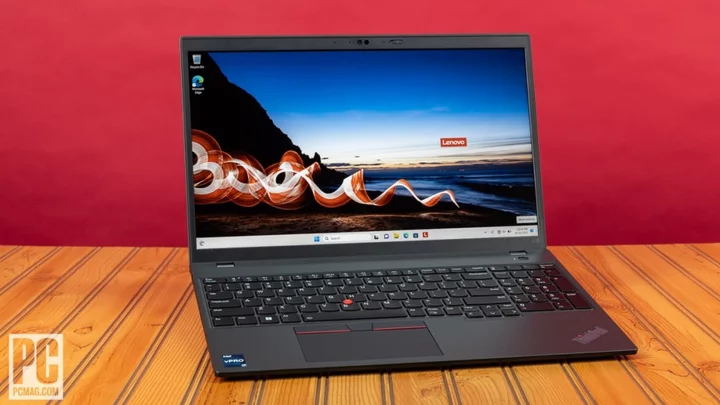Lenovo sells half an alphabet's worth of different ThinkPad business laptops. Some of the designations—like ThinkPad X1 for premium ultralights, ThinkPad T for mainstream corporate models, and ThinkPad P for mobile workstations—are clear enough. Others like the ThinkPad L series are fuzzier—Lenovo calls them "value-priced devices with productivity-rich features." That puts the ThinkPad L15 Gen 4 (starts at $663.30; $1,588.33 as tested) somewhere between entry-level and enterprise. It's a capable workhorse, but a rather dated design that's not really value-priced as tested. We suggest you check out its competitors, including Lenovo's own budget ThinkPad E and small-office ThinkBook series, instead.
Configurations and Design: Choose Your CPU
The ThinkPad L15 is a 15.6-inch general-purpose notebook available in both Intel and AMD flavors, the latter starting at $822.90 with a Ryzen 3 Pro processor while the cheapest Intel config is a $633.30 Core i3. Both feature Windows 11 Home and a full HD (1,920-by-1,080-pixel) non-touch display rated at a dim 250 nits of brightness.
(Credit: Joseph Maldonado)Our review unit (model 21H3004JUS) steps up to a Core i7-1365U (two Performance cores, eight Efficient cores, 12 threads) with Intel's vPro IT management technology; 16GB of RAM; a 512GB NVMe solid-state drive; Windows 11 Pro; and a 300-nit full HD touch screen. It's $1,588.33 at B&H or $1,622.99 at CDW, neither what we'd call a bargain. Business laptops always cost more than consumer units, but spending more than $1,500 nowadays should buy you 1TB of storage or perhaps a more vivid OLED instead of IPS screen.
Clad in Thunder Black ABS plastic, the ThinkPad L15 Gen 4 measures 0.78 by 14.2 by 9.3 inches and weighs 3.91 pounds. The 16-inch HP EliteBook 865 G9 is 0.76 by 14.1 by 9.9 inches and the same weight; the economical Dell Inspiron 15 is a hair thicker but a quarter-pound lighter than the Lenovo.
(Credit: Joseph Maldonado)While you'll notice a bit of flex if you grasp the screen corners or mash the keyboard, the L15 and other ThinkPads have survived MIL-STD 810H torture tests for travel hazards like shock, vibration, and temperature extremes, so you have no risk of a flimsy laptop falling to pieces. The webcam has a sliding privacy shutter; its IR face recognition and a fingerprint reader built into the power button give you two ways to skip typing passwords with Windows Hello.
Most of the system's ports are on its left flank, including Ethernet, HDMI, an audio jack, optional SmartCard, and two USB-C ports suitable for the AC adapter—one USB 3.2, the other Thunderbolt 4. You'll find a USB 3.2 Type-A port, microSD card slot, and security lock slot on the right and a slot for an optional SIM card for mobile broadband at the rear. Wi-Fi 6E and Bluetooth handle wireless connections.
(Credit: Joseph Maldonado) (Credit: Joseph Maldonado)Using the Lenovo ThinkPad L15: Worth Considering, If Only for the Keyboard
The laptop's 1080p webcam works with both the Windows Camera app—which supports recent enhancements like available auto framing and background blur—and Lenovo View, a program that optimizes video quality for ambient light and AC or battery power. It captures well-lit and colorful (if slightly soft-focus) images with almost no noise or static.
Along with MIL-STD 810H testing, ThinkPads are known for their keyboards. Like its siblings, the L15's backlit keyboard is as smooth and comfy as laptop input gets, with an exemplary layout featuring real Home, End, Page Up, and Page Down keys; top-row shortcuts, including keys to place and end Microsoft Teams calls; and a full-size numeric keypad at right. If you can't adjust to Lenovo's placement of the Fn key to the left of Ctrl in the lower left corner, you can swap them with the provided Lenovo Vantage software.
(Credit: Joseph Maldonado)Typing feel is first-class, quiet yet snappy and responsive. Cursor controllers can choose between a touchpad (with a slightly hollow but comfortable click) and Lenovo's TrackPoint mini joystick embedded in the keyboard with three mouse buttons below the space bar. The buttons are big and easy to hit, though they squash the size of the touchpad a little.
Sound from the speaker grille above the keyboard isn't super loud, though it'll fill a room at top volume, and short on bass. But it's clear and listenable with crisp instrumentals; you can make out overlapping tracks. Dolby Access software provides dynamic, game, music, movie, and voice presets, an equalizer, and microphone noise cancellation. The music setting sounds a bit fuller than the others but slightly hollow.
Over the last year or two 15.6-inch, 16:9 aspect ratio screens have yielded the spotlight to slightly taller 16-inch, 16:10 ratio panels and classic IPS technology to OLED displays with higher contrast and bolder hues. The ThinkPad L15 bucks the trend with 1,920-by-1,080 resolution, not that I see anything wrong with that for office apps and mainstream productivity. Viewing angles are broad, and contrast is decent, and colors aren't bad.
(Credit: Joseph Maldonado)They are, however, ordinary. We've seen so many mid-price laptops with punchier colors and sharper resolution that the L15's touch screen looks lackluster by comparison, especially since it's not particularly bright. White backgrounds are clean instead of grayish, helped by the ability to tilt the screen back as far as you like, but the overall effect is uninspiring.
Lenovo Vantage centralizes system and Dolby Audio settings, software updates, Wi-Fi security, and tidbits such as freezing the keyboard, touchpad, and touch screen for a minute or two while you apply a cleaning wipe.
Testing the Lenovo ThinkPad L15: The Run of the Mill
We haven't seen many 15.6-inch business notebooks lately, so our benchmark comparisons aren't exact competitors. The HP Envy x360 15.6 is a consumer convertible, not a corporate clamshell, while that company's EliteBook 865 G9 is a 16-inch business machine. The Dell XPS 15 has higher-wattage components and is more of a content creator than spreadsheet and report manager. Our last slot went to Lenovo's own ThinkPad E16, a slightly differently positioned stablemate we reviewed just before this model.
Productivity Tests
We run the same general productivity benchmarks across both mobile and desktop systems. Our first test is UL's PCMark 10, which simulates a variety of real-world productivity and office workflows to measure overall system performance and also includes a storage subtest for the primary drive.
Our other three benchmarks focus on the CPU, using all available cores and threads, to rate a PC's suitability for processor-intensive workloads. Maxon's Cinebench R23 uses that company's Cinema 4D engine to render a complex scene, while Geekbench 5.4 Pro from Primate Labs simulates popular apps ranging from PDF rendering and speech recognition to machine learning. Finally, we use the open-source video transcoder HandBrake 1.4 to convert a 12-minute video clip from 4K to 1080p resolution (lower times are better).
Finally, we run PugetBench for Photoshop by workstation maker Puget Systems, which uses the Creative Cloud version 22 of Adobe's famous image editor to rate a PC's performance for content creation and multimedia applications. It's an automated extension that executes a variety of general and GPU-accelerated Photoshop tasks ranging from opening, rotating, resizing, and saving an image to applying masks, gradient fills, and filters.
The ThinkPad L15 easily topped the 4,000 points in PCMark 10 that indicate effective productivity for routine tasks like Word and Excel, but it didn't impress elsewhere—it placed last in our CPU tests despite having a Core i7 to the E16 model's Core i5. It's a fine workaday partner, but don't look to it for demanding content creation or multimedia editing.
Graphics Tests
We test Windows PC graphics with two DirectX 12 gaming simulations from UL's 3DMark, Night Raid (more modest, suitable for laptops with integrated graphics) and Time Spy (more demanding, suitable for gaming rigs with discrete GPUs).
To further test graphics, we also run two tests from the cross-platform GPU benchmark GFXBench 5, which stresses both low-level routines like texturing and high-level, game-like image rendering. The 1440p Aztec Ruins and 1080p Car Chase tests, rendered offscreen to accommodate different display resolutions, exercise graphics and compute shaders using the OpenGL programming interface and hardware tessellation respectively. The more frames per second (fps), the better.
Intel's spec sheet says the Core i7-1365U is "Intel Iris Xe Graphics eligible," but our benchmarks and the Windows Device Manager reported that the ThinkPad L15 had the older, even slower integrated Intel UHD Graphics. It showed, as the L15 joined the Core i5 Lenovo at the back of the pack while the Dell, the only contender with a discrete GPU, cruised to victory. The ThinkPad is suitable for video streaming but not serious design, rendering, or gaming.
Battery and Display Tests
We test laptop battery life by playing a locally stored 720p video file (the open-source Blender movie Tears of Steel) with display brightness at 50% and audio volume at 100%. We make sure the battery is fully charged before the test, with Wi-Fi and keyboard backlighting turned off.
To further gauge display performance, we also use a Datacolor SpyderX Elite monitor calibration sensor and its Windows software to measure a laptop screen's color saturation—what percentage of the sRGB, Adobe RGB, and DCI-P3 color gamuts or palettes the display can show—and its 50% and peak brightness in nits (candelas per square meter).
The L15 delivered respectable battery life, but its economy-class display was blown away by the OLED screens of the Envy and XPS 15. You'll find life in IPS technology yet—the HP EliteBook showed color coverage and brightness close to the OLED models—but not much in the base screens of the two ThinkPads.
Verdict: Not Many Complaints, Not Many Raves
You won't find many Lenovo laptops not worth recommending, and almost no non-recommendable ThinkPads. The L15 Gen 4 has the brand's trademark build quality and splendid keyboard, but it's not a standout performer, and its display is disappointing considering the thousand-dollar jump between the base model and our review unit. Corporate fleet buyers will be content, but small offices and solo entrepreneurs can do better, even without springing for the world's-best Lenovo ThinkPad X1 Carbon.









